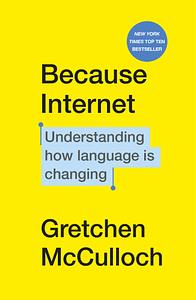Take a photo of a barcode or cover
This was a fun and fast read. I've already recommended it to all my friends with even the slightest interest in linguistics or internet writing.
I haven't read much academic literature since university. I think having to read so much had put me off a little. I am so glad this book came onto my radar- it was really interesting and made me laugh.
This is a book all about how language has changed due to the development and expansion of internet use. McCulloch is obviously so passionate about linguistics: this shines through in her writing and makes the content even more interesting to the reader. It covers memes, grammar, sentence structure, emojis, word choices... everything!
I found out a great deal about language from this book. It has made me consider reading more widely in the field of linguistics. It's fascinating how language has evolved to suit the things which humans want to communicate about and the technologies which we use to do so. I'd often reflected on the changes I had noticed anyway as a Tumblr teen. I come from an interesting generation as, as a child, we had nothing much in the way of online systems. This changed really quickly. I had MSN messenger, and then Tumblr, and now all of the major social media sites.
It was also really positive in its take. I think articles about the internet are often full of despair about the erosion of language, but McCulloch rightly points out that language is there to serve us and that is what the internet has facilitated. Rather than being a new and terrifying thing, the internet is another technological advancement which has allowed a growth in codified informal communication. And informal communication is far from a new thing.
She points out that grammar rules can be a constraint which acts as a barrier to expression for those who do not understand how to use it. I thought that was a fascinating idea too- the internet acts as a democratising tool, allowing all to communicate in the way they wish.
Definitely worth a read, whether you're a linguist or not! We all use the internet and there is bound to be something within these pages that lets you reflect on the way you write or interpret in your online life.
This is a book all about how language has changed due to the development and expansion of internet use. McCulloch is obviously so passionate about linguistics: this shines through in her writing and makes the content even more interesting to the reader. It covers memes, grammar, sentence structure, emojis, word choices... everything!
I found out a great deal about language from this book. It has made me consider reading more widely in the field of linguistics. It's fascinating how language has evolved to suit the things which humans want to communicate about and the technologies which we use to do so. I'd often reflected on the changes I had noticed anyway as a Tumblr teen. I come from an interesting generation as, as a child, we had nothing much in the way of online systems. This changed really quickly. I had MSN messenger, and then Tumblr, and now all of the major social media sites.
It was also really positive in its take. I think articles about the internet are often full of despair about the erosion of language, but McCulloch rightly points out that language is there to serve us and that is what the internet has facilitated. Rather than being a new and terrifying thing, the internet is another technological advancement which has allowed a growth in codified informal communication. And informal communication is far from a new thing.
She points out that grammar rules can be a constraint which acts as a barrier to expression for those who do not understand how to use it. I thought that was a fascinating idea too- the internet acts as a democratising tool, allowing all to communicate in the way they wish.
Definitely worth a read, whether you're a linguist or not! We all use the internet and there is bound to be something within these pages that lets you reflect on the way you write or interpret in your online life.
funny
informative
lighthearted
fast-paced
I was so excited for this book. Lingthusiasm, co-hosted by Gretchen McCulloch and Lauren Gawne, is my absolute favorite podcast. I was actually a bit disappointed by the book.
The conversational style is very similar to the podcast, and I love how enthusiastic Gretchen is about linguistics. I learned many interesting tidbits, though many of the early chapters got really bogged down in things that I don't think needed to be covered in such detail, such as the history of the internet. For awhile, I wasn't sure if this was a book about linguistics! The SJW bits thrown in were irrelevant and very off-putting. There were a few strong hints of "anyone who disagrees with my politics is Hitler/a far-right troll." (Of course, for someone who disagrees with my politics to make a comparison to Hitler is a logical fallacy, but it's okay for me to do it.)
Overall, it's an interesting book.
The conversational style is very similar to the podcast, and I love how enthusiastic Gretchen is about linguistics. I learned many interesting tidbits, though many of the early chapters got really bogged down in things that I don't think needed to be covered in such detail, such as the history of the internet. For awhile, I wasn't sure if this was a book about linguistics! The SJW bits thrown in were irrelevant and very off-putting. There were a few strong hints of "anyone who disagrees with my politics is Hitler/a far-right troll." (Of course, for someone who disagrees with my politics to make a comparison to Hitler is a logical fallacy, but it's okay for me to do it.)
Overall, it's an interesting book.
She divided internet people by the grouping of platforms they first used to socialize online:
old internet people used usenet, forums, IRC, BBS, listservs
full internet people used AIM, MSN Messenger, LiveJournal, MySpace, blogs
semi internet people used Facebook, Twitter, Gchat, YouTube
pre-internet and post-internet people used Instagram, Snapchat, iMessage, WhatsApp
old internet people used usenet, forums, IRC, BBS, listservs
full internet people used AIM, MSN Messenger, LiveJournal, MySpace, blogs
semi internet people used Facebook, Twitter, Gchat, YouTube
pre-internet and post-internet people used Instagram, Snapchat, iMessage, WhatsApp
This was a fascinating book into how the internet has changed our language. I especially enjoyed the chapter on emojis.
hopeful
informative
medium-paced
funny
informative
medium-paced
informative
reflective
Such a great read. I've found myself analyzing the texts I get from my mom (so many commas in a row??) and the tweets I send (using uppercase for EMPHASIS) and every single thing I say and do and write. I especially loved the bit about the internet being a third place. It made me feel so seen as an Internet Person.
“Because Internet” is a linguist’s take on how language functions on digital platforms, and why it has taken on the various forms that it has.
Gretchen McCulloch’s starting point is that the immediacy of the internet has imposed new and novel demands on informal language. We may almost exclusively use writing online, but we are asked to use this written language in a way that more closely resembles spoken language. Informal written language has never had to function this way before, and the idiosyncrasies it has developed in response are what we now recognize as internet language: acronyms like lol, hashtags, emojis, and memes.
Many of the things that make internet language so unique (and strange) are, McCulloch argues, an attempt to add tone of voice to an otherwise impersonal medium. It is difficult to express sarcasm (or sincerity), and pointless to raise an eyebrow, or even gesture, when we are not in the physical presence of someone we are talking to, and thus we turn to emojis and other markers. (And these digital gestures and markers constantly change as the digital landscape changes.) It is a framework that I suspect I will find endlessly useful.
McCulloch’s (very informative) discussions reminded me (and often convinced me) that the digital world is not inherently a place where grammar, punctuation, and other decent writing skills go to die; rather, the internet is simply a different medium – one that demands and requires new forms of expression. The strangeness of what happens to writing online is just the result of people trying to find ways to express themselves in this new medium (and in its constantly changing formats).
Now for my criticisms.
McCulloch is unabashedly enthusiastic about the seemingly unbounded creativity of this informal digital language. Her enthusiasm may be infectious (and to a large degree merited), but it did not entirely convince me – neither of the glorious revival in language use that online communication represents, nor of the necessity and usefulness of the new forms of digital language. Sure, we may gesture while we talk (for example), but most adults I know don’t pepper their conversations with the equivalent of kissy-kissy faces and sparkly unicorn emojis. Internet language can be creative, sure, but it can also be annoyingly, incessantly infantile. It is not always a creativity that fills me with particular enthusiasm.
At one point, McCulloch disparages “the vanilla standardized language of books.” Tell any of our celebrated wordsmiths that their writing is “vanilla,” and they’ll laugh in your face. The internet imposed constraints on informal writing, which responded in wonderful and creative ways. More formal writing, I would argue, responds in exactly the same way: flourishing under the constraints of grammatical rules, etc.
Not surprisingly, McCulloch sides with the view that “standard writing” and “standard punctuation” is, at its core, “arbitrary and elitist.” As a copy-editor, I find this view tiresome every time I encounter it. I am passionate about “standard writing,” in part because I view it as an equalizer of sorts: a well-regulated (but flexible) standard ensures that writing can be accessible to anyone and everyone – whether as writers or as readers. It is, in this sense, not just the opposite of elitism, but antithetical to it. Conversely, one of the difficulties with internet writing is how incomprehensible it can be to anyone not intimately involved in it. Internet writing may be deeply democratic, but it is also prone to being cliquey, which brings its own form of elitism.
McCulloch sees standard writing as a “mastery of rules” that acts “as a way of asserting our intellectual superiority, [rather than] as a way of listening to each other better” – and yet, paradoxically, making sure we are able to listen to each other better is *exactly* what I am attempting to do as an editor.
Those who promote standard writing are not a rules enforcers; they are the guarantors of accessibility. It may be a different form of accessibility than with digital language, but it is accessibility regardless. (McCulloch’s own book is a case in point: her own “standard writing” is wonderfully, playfully accessible.)
“The changeability of language is its strength,” McCulloch argues. But I don’t know a single editor who thinks language shouldn’t be allowed to change. What concerns us more is the speed of this change, the lack of reflection regarding this change, and the dismissal of what might be lost in the process – things like nuance and precision, and a depth and complexity of language, for example. My fear is not that language will change; my fear is that we will all end up talking like a Donald Trump tweet.
Gretchen McCulloch’s starting point is that the immediacy of the internet has imposed new and novel demands on informal language. We may almost exclusively use writing online, but we are asked to use this written language in a way that more closely resembles spoken language. Informal written language has never had to function this way before, and the idiosyncrasies it has developed in response are what we now recognize as internet language: acronyms like lol, hashtags, emojis, and memes.
Many of the things that make internet language so unique (and strange) are, McCulloch argues, an attempt to add tone of voice to an otherwise impersonal medium. It is difficult to express sarcasm (or sincerity), and pointless to raise an eyebrow, or even gesture, when we are not in the physical presence of someone we are talking to, and thus we turn to emojis and other markers. (And these digital gestures and markers constantly change as the digital landscape changes.) It is a framework that I suspect I will find endlessly useful.
McCulloch’s (very informative) discussions reminded me (and often convinced me) that the digital world is not inherently a place where grammar, punctuation, and other decent writing skills go to die; rather, the internet is simply a different medium – one that demands and requires new forms of expression. The strangeness of what happens to writing online is just the result of people trying to find ways to express themselves in this new medium (and in its constantly changing formats).
Now for my criticisms.
McCulloch is unabashedly enthusiastic about the seemingly unbounded creativity of this informal digital language. Her enthusiasm may be infectious (and to a large degree merited), but it did not entirely convince me – neither of the glorious revival in language use that online communication represents, nor of the necessity and usefulness of the new forms of digital language. Sure, we may gesture while we talk (for example), but most adults I know don’t pepper their conversations with the equivalent of kissy-kissy faces and sparkly unicorn emojis. Internet language can be creative, sure, but it can also be annoyingly, incessantly infantile. It is not always a creativity that fills me with particular enthusiasm.
At one point, McCulloch disparages “the vanilla standardized language of books.” Tell any of our celebrated wordsmiths that their writing is “vanilla,” and they’ll laugh in your face. The internet imposed constraints on informal writing, which responded in wonderful and creative ways. More formal writing, I would argue, responds in exactly the same way: flourishing under the constraints of grammatical rules, etc.
Not surprisingly, McCulloch sides with the view that “standard writing” and “standard punctuation” is, at its core, “arbitrary and elitist.” As a copy-editor, I find this view tiresome every time I encounter it. I am passionate about “standard writing,” in part because I view it as an equalizer of sorts: a well-regulated (but flexible) standard ensures that writing can be accessible to anyone and everyone – whether as writers or as readers. It is, in this sense, not just the opposite of elitism, but antithetical to it. Conversely, one of the difficulties with internet writing is how incomprehensible it can be to anyone not intimately involved in it. Internet writing may be deeply democratic, but it is also prone to being cliquey, which brings its own form of elitism.
McCulloch sees standard writing as a “mastery of rules” that acts “as a way of asserting our intellectual superiority, [rather than] as a way of listening to each other better” – and yet, paradoxically, making sure we are able to listen to each other better is *exactly* what I am attempting to do as an editor.
Those who promote standard writing are not a rules enforcers; they are the guarantors of accessibility. It may be a different form of accessibility than with digital language, but it is accessibility regardless. (McCulloch’s own book is a case in point: her own “standard writing” is wonderfully, playfully accessible.)
“The changeability of language is its strength,” McCulloch argues. But I don’t know a single editor who thinks language shouldn’t be allowed to change. What concerns us more is the speed of this change, the lack of reflection regarding this change, and the dismissal of what might be lost in the process – things like nuance and precision, and a depth and complexity of language, for example. My fear is not that language will change; my fear is that we will all end up talking like a Donald Trump tweet.





